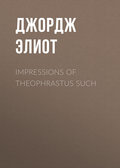
Джордж Элиот
Romola
Chapter Fifty Three.
On San Miniato
“I would speak with you,” said Baldassarre, as Romola looked at him in silent expectation. It was plain that he had followed her, and had been waiting for her. She was going at last to know the secret about him.
“Yes,” she said, with the same sort of submission that she might have shown under an imposed penance. “But you wish to go where no one can hear us?”
“Where he will not come upon us,” said Baldassarre, turning and glancing behind him timidly. “Out—in the air—away from the streets.”
“I sometimes go to San Miniato at this hour,” said Romola. “If you like, I will go now, and you can follow me. It is far, but we can be solitary there.”
He nodded assent, and Romola set out. To some women it might have seemed an alarming risk to go to a comparatively solitary spot with a man who had some of the outward signs of that madness which Tito attributed to him. But Romola was not given to personal fears, and she was glad of the distance that interposed some delay before another blow fell on her. The afternoon was far advanced, and the sun was already low in the west, when she paused on some rough ground in the shadow of the cypress-trunks, and looked round for Baldassarre. He was not far off, but when he reached her, he was glad to sink down on an edge of stony earth. His thickset frame had no longer the sturdy vigour which belonged to it when he first appeared with the rope round him in the Duomo; and under the transient tremor caused by the exertion of walking up the hill, his eyes seemed to have a more helpless vagueness.
“The hill is steep,” said Romola, with compassionate gentleness, seating herself by him. “And I fear you have been weakened by want?”
He turned his head and fixed his eyes on her in silence, unable, now the moment of speech was come, to seize the words that would convey the thought he wanted to utter: and she remained as motionless as she could, lest he should suppose her impatient. He looked like nothing higher than a common-bred, neglected old man; but she was used now to be very near to such people, and to think a great deal about their troubles. Gradually his glance gathered a more definite expression, and at last he said with abrupt emphasis—
“Ah! you would have been my daughter!”
The swift flush came in Romola’s face and went back again as swiftly, leaving her with white lips a little apart, like a marble image of horror. For her mind, the revelation was made. She divined the facts that lay behind that single word, and in the first moment there could be no check to the impulsive belief which sprang from her keen experience of Tito’s nature. The sensitive response of her face was a stimulus to Baldassarre; for the first time his words had wrought their right effect. He went on with gathering eagerness and firmness, laying his hand on her arm.
“You are a woman of proud blood—is it not true? You go to hear the preacher; you hate baseness—baseness that smiles and triumphs. You hate your husband?”
“Oh God! were you really his father?” said Romola, in a low voice, too entirely possessed by the images of the past to take any note of Baldassarre’s question. “Or was it as he said? Did you take him when he was little?”
“Ah, you believe me—you know what he is!” said Baldassarre, exultingly, tightening the pressure on her arm, as if the contact gave him power. “You will help me?”
“Yes,” said Romola, not interpreting the words as he meant them. She laid her palm gently on the rough hand that grasped her arm, and the tears came to her eyes as she looked at him. “Oh, it is piteous! Tell me—you were a great scholar; you taught him. How is it?”
She broke off Tito’s allegation of this man’s madness had come across her; and where were the signs even of past refinement? But she had the self-command not to move her hand. She sat perfectly still, waiting to listen with new caution.
“It is gone!—it is all gone!” said Baldassarre; “and they would not believe me, because he lied, and said I was mad; and they had me dragged to prison. And I am old—my mind will not come back. And the world is against me.”
He paused a moment, and his eyes sank as if he were under a wave of despondency. Then he looked up at her again, and said with renewed eagerness—“But you are not against me. He made you love him, and he has been false to you; and you hate him. Yes, he made me love him: he was beautiful and gentle, and I was a lonely man. I took him when they were beating him. He slept in my bosom when he was little, and I watched him as he grew, and gave him all my knowledge, and everything that was mine I meant to be his. I had many things; money, and books, and gems. He had my gems—he sold them; and he left me in slavery. He never came to seek me, and when I came back poor and in misery, he denied me. He said I was a madman.”
“He told us his father was dead—was drowned,” said Romola, faintly. “Surely he must have believed it then. Oh! he could not have been so base then!”
A vision had risen of what Tito was to her in those first days when she thought no more of wrong in him than a child thinks of poison in flowers. The yearning regret that lay in that memory brought some relief from the tension of horror. With one great sob the tears rushed forth.
“Ah, you are young, and the tears come easily,” said Baldassarre, with some impatience. “But tears are no good; they only put out the fire within, and it is the fire that works. Tears will hinder us. Listen to me.”
Romola turned towards him with a slight start. Again the possibility of his madness had darted through her mind, and checked the rush of belief. If, after all, this man were only a mad assassin? But her deep belief in this story still lay behind, and it was more in sympathy than in fear that she avoided the risk of paining him by any show of doubt.
“Tell me,” she said, as gently as she could, “how did you lose your memory—your scholarship.”
“I was ill. I can’t tell how long—it was a blank. I remember nothing, only at last I was sitting in the sun among the stones, and everything else was darkness. And slowly, and by degrees, I felt something besides that: a longing for something—I did not know what—that never came. And when I was in the ship on the waters I began to know what I longed for; it was for the Boy to come back—it was to find all my thoughts again, for I was locked away outside them all. And I am outside now. I feel nothing but a wall and darkness.”
Baldassarre had become dreamy again, and sank into silence, resting his head between his hands; and again Romola’s belief in him had submerged all cautioning doubts. The pity with which she dwelt on his words seemed like the revival of an old pang. Had she not daily seen how her father missed Dino and the future he had dreamed of in that son?
“It all came back once,” Baldassarre went on presently. “I was master of everything. I saw all the world again, and my gems, and my books; and I thought I had him in my power, and I went to expose him where—where the lights were and the trees; and he lied again, and said I was mad, and they dragged me away to prison… Wickedness is strong; and he wears armour.”
The fierceness had flamed up again. He spoke with his former intensity, and again he grasped Romola’s arm.
“But you will help me? He has been false to you too. He has another wife, and she has children. He makes her believe he is her husband, and she is a foolish, helpless thing. I will show you where she lives.”
The first shock that passed through Romola was visibly one of anger. The woman’s sense of indignity was inevitably foremost. Baldassarre instinctively felt her in sympathy with him.
“You hate him,” he went on. “Is it not true? There is no love between you; I know that. I know women can hate; and you have proud blood. You hate falseness, and you can love revenge.”
Romola sat paralysed by the shock of conflicting feelings. She was not conscious of the grasp that was bruising her tender arm.
“You shall contrive it,” said Baldassarre, presently, in an eager whisper. “I have learned by heart that you are his rightful wife. You are a noble woman. You go to hear the preacher of vengeance; you will help justice. But you will think for me. My mind goes—everything goes sometimes—all but the fire. The fire is God: it is justice: it will not die. You believe that—is it not true? If they will not hang him for robbing me, you will take away his armour—you will make him go without it, and I will stab him. I have a knife, and my arm is still strong enough.”
He put his hand under his tunic, and reached out the hidden knife, feeling the edge abstractedly, as if he needed the sensation to keep alive his ideas.
It seemed to Romola as if every fresh hour of her life were to become more difficult than the last. Her judgment was too vigorous and rapid for her to fall into, the mistake of using futile deprecatory words to a man in Baldassarre’s state of mind. She chose not to answer his last speech. She would win time for his excitement to allay itself by asking something else that she cared to know. She spoke rather tremulously—
“You say she is foolish and helpless—that other wife—and believes him to be her real husband. Perhaps he is: perhaps he married her before he married me.”
“I cannot tell,” said Baldassarre, pausing in that action of feeling the knife, and looking bewildered. “I can remember no more. I only know where she lives. You shall see her. I will take you; but not now,” he added hurriedly, “he may be there. The night is coming on.”
“It is true,” said Romola, starting up with a sudden consciousness that the sun had set and the hills were darkening; “but you will come and take me—when?”
“In the morning,” said Baldassarre, dreaming that she, too, wanted to hurry to her vengeance.
“Come to me, then, where you came to me to-day, in the church. I will be there at ten; and if you are not there, I will go again towards mid-day. Can you remember?”
“Mid-day,” said Baldassarre—“only mid-day. The same place, and mid-day. And, after that,” he added, rising and grasping her arm again with his left hand, while he held the knife in his right; “we will have our revenge. He shall feel the sharp edge of justice. The world is against me, but you will help me.”
“I would help you in other ways,” said Romola, making a first, timid effort to dispel his illusion about her. “I fear you are in want; you have to labour, and get little. I should like to bring you comforts, and make you feel again that there is some one who cares for you.”
“Talk no more about that,” said Baldassarre, fiercely. “I will have nothing else. Help me to wring one drop of vengeance on this side of the grave. I have nothing but my knife. It is sharp; but there is a moment after the thrust when men see the face of death,—and it shall be my face that he will see.”
He loosed his hold, and sank down again in a sitting posture. Romola felt helpless: she must defer all intentions till the morrow.
“Mid-day, then,” she said, in a distinct voice.
“Yes,” he answered, with an air of exhaustion. “Go; I will rest here.”
She hastened away. Turning at the last spot whence he was likely to be in sight, she saw him seated still.
Chapter Fifty Four.
The Evening and the Morning
Romola had a purpose in her mind as she was hastening away; a purpose which had been growing through the afternoon hours like a side-stream, rising higher and higher along with the main current. It was less a resolve than a necessity of her feeling. Heedless of the darkening streets, and not caring to call for Maso’s slow escort, she hurried across the bridge where the river showed itself black before the distant dying red, and took the most direct way to the Old Palace. She might encounter her husband there. No matter. She could not weigh probabilities; she must discharge her heart. She did not know what she passed in the pillared court or up the wide stairs; she only knew that she asked an usher for the Gonfaloniere, giving her name, and begging to be shown into a private room.
She was not left long alone with the frescoed figures and the newly-lit tapers. Soon the door opened, and Bernardo del Nero entered, still carrying his white head erect above his silk lucco.
“Romola, my child, what is this?” he said, in a tone of anxious surprise as he closed the door.
She had uncovered her head and went towards him without speaking. He laid his hand on her shoulder, and held her a little way from him that he might see her better. Her face was haggard from fatigue and long agitation, her hair had rolled down in disorder; but there was an excitement in her eyes that seemed to have triumphed over the bodily consciousness.
“What has he done?” said Bernardo, abruptly. “Tell me everything, child; throw away pride. I am your father.”
“It is not about myself—nothing about myself,” said Romola, hastily. “Dearest godfather, it is about you. I have heard things—some I cannot tell you. But you are in danger in the palace; you are in danger everywhere. There are fanatical men who would harm you, and—and there are traitors. Trust nobody. If you trust, you will be betrayed.”
Bernardo smiled.
“Have you worked yourself up into this agitation, my poor child,” he said, raising his hand to her head and patting it gently, “to tell such old truth as that to an old man like me?”
“Oh no, no! they are not old truths that I mean,” said Romola, pressing her clasped hands painfully together, as if that action would help her to suppress what must not be told. “They are fresh things that I know, but cannot tell. Dearest godfather, you know I am not foolish. I would not come to you without reason. Is it too late to warn you against any one, every one who seems to be working on your side? Is it too late to say, ‘Go to your villa and keep away in the country when these three more days of office are over?’ Oh God! perhaps it is too late! and if any harm comes to you, it will be as if I had done it!”
The last words had burst from Romola involuntarily: a long-stifled feeling had found spasmodic utterance. But she herself was startled and arrested.
“I mean,” she added, hesitatingly, “I know nothing positive. I only know what fills me with fears.”
“Poor child!” said Bernardo, looking at her with quiet penetration for a moment or two. Then he said: “Go, Romola—go home and rest. These fears may be only big ugly shadows of something very little and harmless. Even traitors must see their interest in betraying; the rats will run where they smell the cheese, and there is no knowing yet which way the scent will come.”
He paused, and turned away his eyes from her with an air of abstraction, till, with a slow shrug, he added—
“As for warnings, they are of no use to me, child. I enter into no plots, but I never forsake my colours. If I march abreast with obstinate men, who will rush on guns and pikes, I must share the consequences. Let us say no more about that. I have not many years left at the bottom of my sack for them to rob me of. Go, child; go home and rest.”
He put his hand on her head again caressingly, and she could not help clinging to his arm, and pressing her brow against his shoulder. Her godfather’s caress seemed the last thing that was left to her out of that young filial life, which now looked so happy to her even in its troubles, for they were troubles untainted by anything hateful.
“Is silence best, my Romola?” said the old man.
“Yes, now; but I cannot tell whether it always will be,” she answered, hesitatingly, raising her head with an appealing look.
“Well, you have a father’s ear while I am above ground,”—he lifted the black drapery and folded it round her head, adding—“and a father’s home; remember that,” Then opening the door, he said: “There, hasten away. You are like a black ghost; you will be safe enough.”
When Romola fell asleep that night, she slept deep. Agitation had reached its limits; she must gather strength before she could suffer more; and, in spite of rigid habit, she slept on far beyond sunrise.
When she awoke, it was to the sound of guns. Piero de’ Medici, with thirteen hundred men at his back, was before the gate that looks towards Rome.
So much Romola learned from Maso, with many circumstantial additions of dubious quality. A countryman had come in and alarmed the Signoria before it was light, else the city would have been taken by surprise. His master was not in the house, having been summoned to the Palazzo long ago. She sent out the old man again, that he might gather news, while she went up to the loggia from time to time to try and discern any signs of the dreaded entrance having been made, or of its having been effectively repelled. Maso brought her word that the great Piazza was full of armed men, and that many of the chief citizens suspected as friends of the Medici had been summoned to the palace and detained there. Some of the people seemed not to mind whether Piero got in or not, and some said the Signoria itself had invited him; but however that might be, they were giving him an ugly welcome; and the soldiers from Pisa were coming against him.
In her memory of those morning hours, there were not many things that Romola could distinguish as actual external experiences standing markedly out above the tumultuous waves of retrospect and anticipation. She knew that she had really walked to the Badia by the appointed time in spite of street alarms; she knew that she had waited there in vain. And the scene she had witnessed when she came out of the church, and stood watching on the steps while the doors were being closed behind her for the afternoon interval, always came back to her like a remembered waking.
There was a change in the faces and tones of the people, armed and unarmed, who were pausing or hurrying along the streets. The guns were firing again, but the sound only provoked laughter. She soon knew the cause of the change. Piero de’ Medici and his horsemen had turned their backs on Florence, and were galloping as fast as they could along the Siena road. She learned this from a substantial shop-keeping Piagnone, who had not yet laid down his pike.
“It is true,” he ended, with a certain bitterness in his emphasis. “Piero is gone, but there are those left behind who were in the secret of his coming—we all know that; and if the new Signoria does its duty we shall soon know who they are.”
The words darted through Romola like a sharp spasm; but the evil they foreshadowed was not yet close upon her, and as she entered her home again, her most pressing anxiety was the possibility that she had lost sight for a long while of Baldassarre.
Chapter Fifty Five.
Waiting
The lengthening sunny days went on without bringing either what Romola most desired or what she most dreaded. They brought no sign from Baldassarre, and, in spite of special watch on the part of the Government, no revelation of the suspected conspiracy. But they brought other things which touched her closely, and bridged the phantom-crowded space of anxiety with active sympathy in immediate trial. They brought the spreading Plague and the Excommunication of Savonarola.
Both these events tended to arrest her incipient alienation from the Frate, and to rivet again her attachment to the man who had opened to her the new life of duty, and who seemed now to be worsted in the fight for principle against profligacy. For Romola could not carry from day to day into the abodes of pestilence and misery the sublime excitement of a gladness that, since such anguish existed, she too existed to make some of the anguish less bitter, without remembering that she owed this transcendent moral life to Fra Girolamo. She could not witness the silencing and excommunication of a man whose distinction from the great mass of the clergy lay, not in any heretical belief, not in his superstitions, but in the energy with which he sought to make the Christian life a reality, without feeling herself drawn strongly to his side.
Far on in the hot days of June the Excommunication, for some weeks arrived from Rome, was solemnly published in the Duomo. Romola went to witness the scene, that the resistance it inspired might invigorate that sympathy with Savonarola which was one source of her strength. It was in memorable contrast with the scene she had been accustomed to witness there.
Instead of upturned citizen-faces filling the vast area under the morning light, the youngest rising amphitheatre-wise towards the walls, and making a garland of hope around the memories of age—instead of the mighty voice thrilling all hearts with the sense of great things, visible and invisible, to be struggled for—there were the bare walls at evening made more sombre by the glimmer of tapers; there was the black and grey flock of monks and secular clergy with bent, unexpectant faces; there was the occasional tinkling of little bells in the pauses of a monotonous voice reading a sentence which had already been long hanging up in the churches; and at last there was the extinction of the tapers, and the slow, shuffling tread of monkish feet departing in the dim silence.
Romola’s ardour on the side of the Frate was doubly strengthened by the gleeful triumph she saw in hard and coarse faces, and by the fear-stricken confusion in the faces and speech of many among his strongly-attached friends. The question where the duty of obedience ends, and the duty of resistance begins, could in no case be an easy one; but it was made overwhelmingly difficult by the belief that the Church was—not a compromise of parties to secure a more or less approximate justice in the appropriation of funds, but—a living organism, instinct with Divine power to bless and to curse. To most of the pious Florentines, who had hitherto felt no doubt in their adherence to the Frate, that belief in the Divine potency of the Church was not an embraced opinion, it was an inalienable impression, like the concavity of the blue firmament; and the boldness of Savonarola’s written arguments that the Excommunication was unjust, and that, being unjust, it was not valid, only made them tremble the more, as a defiance cast at a mystic image, against whose subtle immeasurable power there was neither weapon nor defence.
But Romola, whose mind had not been allowed to draw its early nourishment from the traditional associations of the Christian community in which her father had lived a life apart, felt her relation to the Church only through Savonarola; his moral force had been the only authority to which she had bowed; and in his excommunication she only saw the menace of hostile vice: on one side she saw a man whose life was devoted to the ends of public virtue and spiritual purity, and on the other the assault of alarmed selfishness, headed by a lustful, greedy, lying, and murderous old man, once called Rodrigo Borgia, and now lifted to the pinnacle of infamy as Pope Alexander the Sixth. The finer shades of fact which soften the edge of such antitheses are not apt to be seen except by neutrals, who are not distressed to discern some folly in martyrs and some judiciousness in the men who burnt them. But Romola required a strength that neutrality could not give; and this Excommunication, which simplified and ennobled the resistant position of Savonarola by bringing into prominence its wider relations, seemed to come to her like a rescue from the threatening isolation of criticism and doubt. The Frate was now withdrawn from that smaller antagonism against Florentine enemies into which he continually fell in the unchecked excitement of the pulpit, and presented himself simply as appealing to the Christian world against a vicious exercise of ecclesiastical power. He was a standard-bearer leaping into the breach. Life never seems so clear and easy as when the heart is beating faster at the sight of some generous self-risking deed. We feel no doubt then what is the highest prize the soul can win; we almost believe in our own power to attain it. By a new current of such enthusiasm Romola was helped through these difficult summer days. She had ventured on no words to Tito that would apprise him of her late interview with Baldassarre, and the revelation he had made to her. What would such agitating, difficult words win from him? No admission of the truth; nothing, probably, but a cool sarcasm about her sympathy with his assassin. Baldassarre was evidently helpless: the thing to be feared was, not that he should injure Tito, but that Tito, coming upon his traces, should carry out some new scheme for ridding himself of the injured man who was a haunting dread to him. Romola felt that she could do nothing decisive until she had seen Baldassarre again, and learned the full truth about that “other wife”—learned whether she were the wife to whom Tito was first bound.
The possibilities about that other wife, which involved the worst wound to her hereditary pride, mingled themselves as a newly-embittering suspicion with the earliest memories of her illusory love, eating away the lingering associations of tenderness with the past image of her husband; and her irresistible belief in the rest of Baldassarre’s revelation made her shrink from Tito with a horror which would perhaps have urged some passionate speech in spite of herself if he had not been more than usually absent from home. Like many of the wealthier citizens in that time of pestilence, he spent the intervals of business chiefly in the country: the agreeable Melema was welcome at many villas, and since Romola had refused to leave the city, he had no need to provide a country residence of his own.
But at last, in the later days of July, the alleviation of those public troubles which had absorbed her activity and much of her thought, left Romola to a less counteracted sense of her personal lot. The Plague had almost disappeared, and the position of Savonarola was made more hopeful by a favourable magistracy, who were writing urgent vindicatory letters to Rome on his behalf, entreating the withdrawal of the Excommunication.
Romola’s healthy and vigorous frame was undergoing the reaction of languor inevitable after continuous excitement and over-exertion; but her mental restlessness would not allow her to remain at home without peremptory occupation, except during the sultry hours. In the cool of the morning and evening she walked out constantly, varying her direction as much as possible, with the vague hope that if Baldassarre were still alive she might encounter him. Perhaps some illness had brought a new paralysis of memory, and he had forgotten where she lived—forgotten even her existence. That was her most sanguine explanation of his non-appearance. The explanation she felt to be most probable was, that he had died of the Plague.







